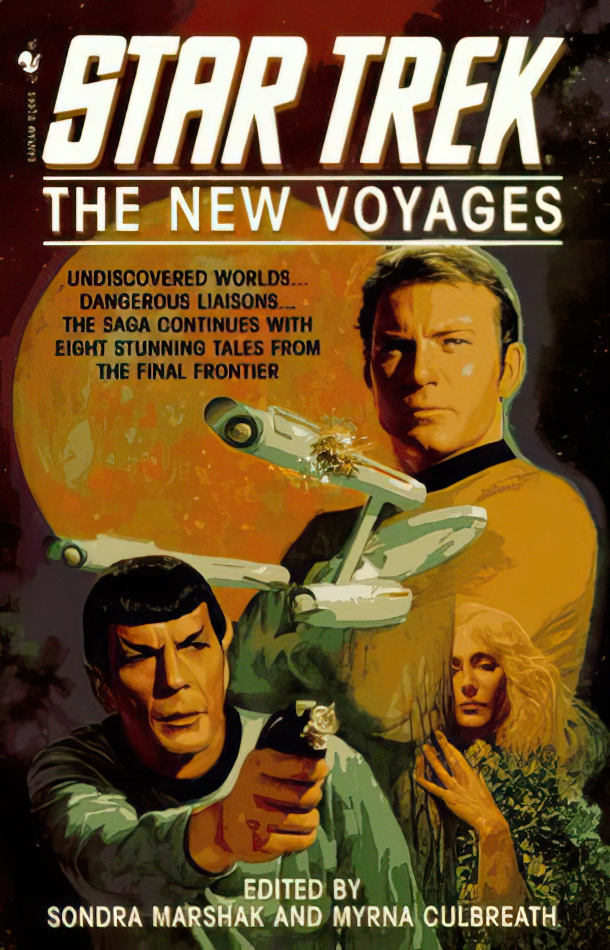 Story: A collection of short stories about the journeys of the starship Enterprise and her crew.
Story: A collection of short stories about the journeys of the starship Enterprise and her crew.
Review: It’s hard to realize nowadays, when fan fiction is so prevalent (some would say invasive) but in 1976, the idea of finding a broader audience for fan fiction (outside of the meager readership of fanzines) was a fantastic notion. Without the all-powerful, all-seeing Internet, the only hope for fanfic writers would be the outlandish idea that Paramount themselves would allow a professionally published collection of such stories. But that’s just what Paramount did. They were about to launch the regular series of Star Trek novels with “Spock, Messiah!” and, perhaps, “Star Trek: The New Voyages” was an easy way to get material out to the public while the more professional work was being finalized. (They also upped the ante by getting Gene Roddenberry and the principal cast to write introductions, maybe as a way to take the curse of fanfic off.) Whatever the reason for the book’s publication, it’s good to know that this isn’t the first properly published Star Trek original fiction (having been preceded by junior novel “Mission to Horatius” and James Blish’s “Spock Must Die!”) as it is one of the most embarrasingly amateurish collection of nonsense ever to get the “official” stamp of approval. It basically proves that fan fiction hasn’t changed all that much in thirty years: it stinks.
Now, this is the point where I would usually say “Not that this collection doesn’t have it’s good points” or something like that. I try to be fair and give even the worst dreck its due. Unfortunately, I couldn’t say such a thing in this case and keep my honor intact. These stories are awful; the worst kind of fanwank with no one at the wheel steering these “authors” away from the dangerous rocks. Crash against them they do, again and again and again.
The stories are as follows: “Ni Var” by Claire Gabriel (Spock is split into a human half and a Vulcan half), “Intersection Point” by Juanita Coulson (the ship becomes trapped in a spacial anomaly), “The Enchanted Pool” by Marcia Ericson (Spock crashes onto a planet apparently populated by fairies), “Visit to a Weird Planet Revisited” by Ruth Berman (William Shatner, Leonard Nimoy and DeForest Kelley switch places with their fictional counterparts), “The Face on the Barroom Floor” by Eleanor Arnason and Ruth Berman (a tale of shore leave misadventures), “The Hunting” by Doris Beetem (Spock undertakes a Vulcan ritual – the “Mok Farr” – whereby he mind-melds with an animal), “The Winged Dreamers” by Jennifer Guttridge (the crew falls under the influence of telepathic butterflies), “Mind-Sifter” by Shirley Maiewski (Kirk is abducted by Klingons, tortured to insanity and lost in time), and a “Sonnet from the Vulcan: Omicron Ceti Three” by Shirley Meech (a tedious bit of lovesick doggerel).
Maybe you caught something in that list, something that I, myself, didn’t notice until I was almost done. “Star Trek: The New Voyages” was entirely written and edited by women. (Except for the introductions, of course.) I’m not sure what that means in the grand scheme of things, but it may account for the high number of long, deep looks into Spock’s psyche to which the reader is subjected. (If you ever need proof of Spock’s effect on female fans of the seventies, here it is.) This is not a criticism, mind you, just an observation.
Besides, as I indicated earlier, there are plenty of other things to legitimately criticize. Like the silly dialogue and preposterous actions of the Enterprise crew. I know that there was (and is) a strong homo-erotic streak in Star Trek fanfiction where Kirk and Spock are concerned, but when two different authors have a character talking about their “special relationship” and almost “saying too much”, you know that stuff ran a bit too deep. And I don’t care if Kirk was in love with Spock (a point so prevalent in 1970s fandom that even Roddenberry himself felt he had to address it in his novelization of Star Trek: The Motion Picture), I can’t see him “bounding into” Spock’s quarters, inviting him to come on shore leave, “grinned widely at him, excitement showing in his face and manner”, then dashing off with a wink as he does in one of the stories. (No, I’m not telling you which one. You’ll have to suffer through these yourself if you want to know.)
Few of the other characters act any more appropriately. In that same story, much of the crew (Scotty, Sulu, Uhura, etc.) talk out of turn, defy orders and generally act more independent-minded than the trained military crew they were shown to be in the series. The new characters are throwaway, useless creations that don’t even stand up to the least significant series character. Think of crewmen like Riley who, despite just a couple of appearances, was a vibrant character. Nothing like that here.
And, of course, there are the normal foibles of fan fiction: copious mentions of canon stories, the presence of “Mary Sues”, and lots and lots of bad dialogue. In fact, the only parts of the book that seem real and effective are the introductions. The cast, particularly, seem appreciative of the efforts of the fan writers, but I found it hard to believe they actually read this stuff and liked it as much as they say they did. (Being diplomatic, perhaps.)
So, to sum up, there’s a reason fan fiction doesn’t often get legitimately published. “Star Trek: The New Voyages” is a poster child for why it should stay out of the light.
Year: 1976
Editors: Sondra Marshak & Myrna Culbreath
Publisher: Bantam
Pages: 127

